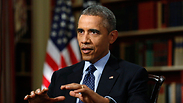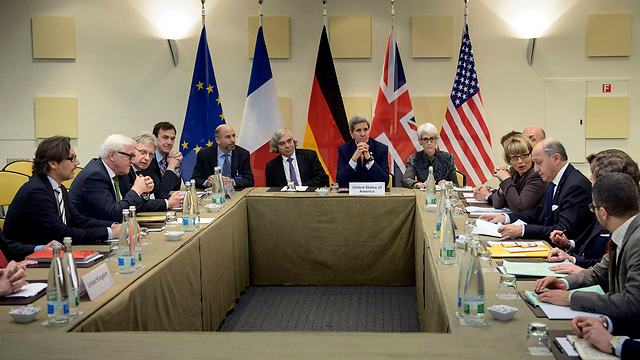
I doubt anyone will remember US President Barack Obama and Secretary of State John Kerry – who led this move – in two years from now, but the legacy of ruins they left behind in every corner they touched in the Middle East will remain with us for many years to come.
The United Nations Security Council secretariat has already received a draft resolution cancelling all the sanctions imposed on Iran in the past decade, excluding those related to the proliferation of conventional and nuclear weapons. The United States is thereby giving Iran a status similar to that of developed countries like Japan. Just a minor difference.
There is no wonder that Defense Minister Moshe Ya'alon and Chief of Staff Gadi Eisenkot have instructed the defense establishment and IDF to prepare for a situation in which Iran officially enters the domain allowing it to be a nuclear threshold state, which has broken free from the chains of most sanctions. This means that Iran, after all the bans are gradually removed, will continue its subversive activity in the Middle East unhindered.
A signed agreement between Iran and the world powers holds significant budgetary and operational ramifications for the multi-year work plan the IDF has to complete by June. In other words, the army and intelligence agencies are working on their intelligence and operational abilities ahead of a possible decision to stop this threat at any point in time.
Last week, when the members of the Iranian delegation in Switzerland left for consultations, it was clear to the Americans that they were ready to sign. The main problem revealed over the past week was actually between the world powers: The Americans found it difficult to convince their allies, mainly France, to finalize the deal.
Despite the disputes which still remain – for example, over Iran's ability to continue its nuclear research and development – no one in Jerusalem has a doubt that France will eventually accept the agreement, which will likely be signed on Sunday or Monday.
The main achievement, as far as the Iranians are concerned, is the removal of the sanctions imposed on them by the Security Council. Although some of the economic sanctions imposed by the US Congress will remain, cancelling the Security Council resolutions is extremely significant: It basically brings Iran back into the family of nations. In other words, all the international companies which are wandering around Iran, looking for breaches in order to do business there again, will now receive the green light.
Even if the agreement taking shape will continue the bans on selling components which could be used for the Iranian nuclear program, and will continue banning Iran from exporting weapons, it is nothing more than a sad joke at our expense. And this is the Obama administration's strategic failure: As we speak, pro-American forces on behalf of Saudi Arabia, Egypt, Jordan and the Gulf states are fighting in Yemen – with American aid – against Shiite forces sponsored by the same Iranian weapons and in coordination with Tehran.
Try to find the logic in the American foreign policy, which appears to be detached from reality: The Iranians will never meet the Security Council's demands not to supply weapons to the rebels in Yemen and to Hezbollah, Syria, Iraq or Hamas – and that's just a partial list of places where Iran is active against American interests. It's unclear what makes Obama believe that after an agreement is signed in Switzerland, they will change direction and fulfill their obligations this time – rather than disregard the entire world as they have been doing in recent years.
Absurdity is having a blast in the Middle East, with Obama's help: The transfer of Iranian weapons to the rebels in Yemen is not being prevented by the Americans or the Europeans, but rather by the air forces of the Gulf emirates, which have closed the flight paths between the countries.
The Americans have apparently given in on a few fronts in the negotiations with the Iranians. The US is preparing to allow Iran to resume the nuclear research and development, which it is insisting on continuing, within a few years. Although the number of centrifuges that the Iranians will be allowed to operate will be restricted – and they will be prevented from replacing the old centrifuges with new ones – the Iranians are still refusing to expose information about the extent of their military nuclear development.
The agreement will be valid for 10 to 12 years. However, interim dates have been set to discuss further easements of the sanctions. The agreement includes no trace of the development of ballistic missiles and Iran's involvement in terror, which may continue with no interruptions.
The document of principles, which will kick off the discussions ahead of a permanent agreement between Iran and the world powers, which is expected to be signed in June, may not be signed at all but only agreed upon verbally at the Iranians' demand.
The White House is eager to submit a written and signed agreement to the Congress, which it will be able to present as an "achievement" delaying the Iranian nuclear race by one year – and the Iranians are taking good advantage of that. The Obama administration hopes that this move will curb the legislation taking shape in the Congress to tighten the sanctions on Iran, and will freeze lawmakers' attempt to force him to bring every future agreement with Iran to their approval.
The bottom line is that the Americans have a bad political agreement in their hands which may give the Obama administration industrial peace until the end of its term, but leaves the nuclear cloud in the Middle Eastern sky for many years to come.

















